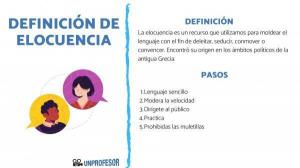What is RHETORIC
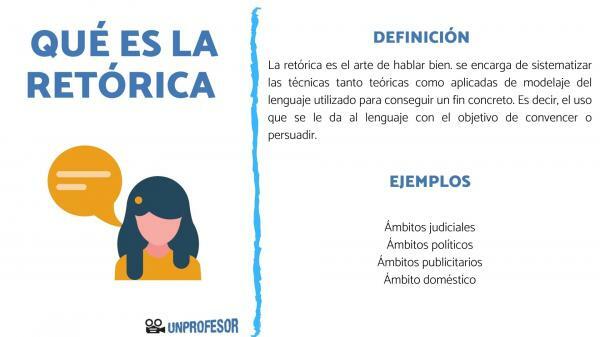
It is possible that you have ever found yourself in the position of needing to express a feeling or thought in a concrete way in order for someone to receive the message with some values determined. The language can be shaped to your liking with endless ancient techniques that make the same sentence provoke different feelings in those who receive it. This is where what we know as rhetoric comes into play. In this lesson from a teacher we are going to discover you what is rhetoric and examples of it so that you better understand this concept of linguistics.
Index
- What is rhetoric? Simple definition
- Origin of rhetoric
- Aristotle's rhetoric: 4 essential points
- Examples of rhetoric today
What is rhetoric? Simple definition.
We begin by discovering what rhetoric is to know what we are referring to. Rhetoric is the art of speaking well. No more no less.
Already studied in ancient Greece and Rome, this linguistic and, in a certain way, pragmatic discipline has shown that
the important thing is not what is said but how it is said. Whether to persuade, move, or other purposes, rhetoric has been used, analyzed, and studied by playwrights, poets, and politicians for centuries to empower their speeches. And yes, anyone also unconsciously uses the use of rhetorical speech in their day to day life.In short, rhetoric is responsible for systematizing both theoretical and applied modeling techniques of the language used to achieve a specific goal. Namely, the use that is given to the language with the aim of convincing or persuading.
With that, we adorn the prayers not only with the intonation, pronunciation and volume of the voice, but also with the use of what we know as rhetorical figures that are an indispensable part of this type of discourse.
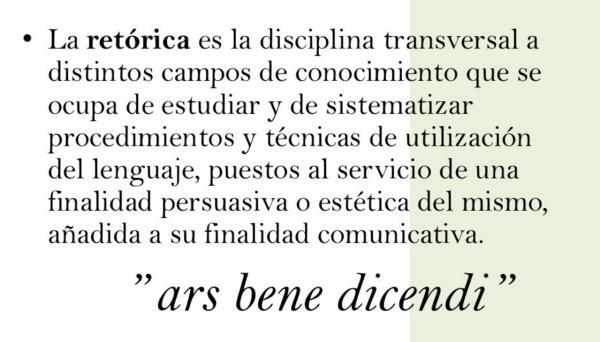
Image: Slideshare
Origin of rhetoric.
After the establishment of democracy in classical Greece, a large number of people had to dispute the division of their lands in court. In order to convince the jury, landowners interested in recovering their land had to train the art of the word. This is how rhetoric was born, a linguistic discipline that has survived to our times. The language was adorned with linguistic paraphernalia that made it more striking or persuasive.
Among the main authors who collected the bases of this millenary technique of achieving what one seeks through the mere use of language, beyond Corax of Syracuse and the sophists such as Gorgias, Plato and Socrates (who also treated this discipline in depth), we are going to highlight, first of all, what was presented in the Rhetoric of the Hellenic philosopher Aristotle.
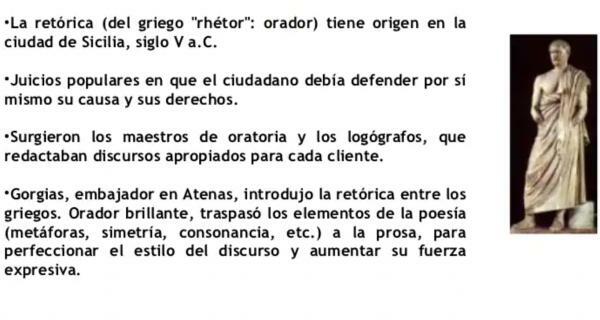
Aristotle's rhetoric: 4 essential points.
It is The Rhetoric of Aristotle It is where this art is synthesized in four main points, which are:
Inventio (Invention)
The process by which you choose which arguments are valid and which ones are not for the persuasive purpose sought.
Device (Provision)
These ideas are structured and embedded in a whole, that is, a text endowed with cohesion and coherence. This is where we find four relevant subsections when it comes to constructing a persuasive speech, and which is very useful even today. These points would be, in order:
- Exordium: Introduction to the argument of the speech.
- Narration: Exposition of the main topic which must be brief, clear and coherent.
- Argumentation: Where the main persuasive arguments are presented.
- Preoration: Final conclusive auction that aims to move the masses. That is, to persuade the recipient.
Elocutio (Elocution)
Where the bulk of rhetoric go into action. It is at this moment that what we know as rhetorical figures they tinker with our text to build an effective speech. Here the linguistic embellishment is paramount and the use of the metaphors, epithets, similes, alliterations, etc.
Pronuntiatio (Action)
The moment of truth has arrived, in which everything previously elaborated comes into play. This is the last step, perhaps the most important, since it is time to get into “action” with the oral reproduction of speech before the other interlocutors.
In addition, we must especially mention a fifth point of effective rhetorical discourse (which would be placed between elocutio Y pronuntiatio) proposed later by Quintilian a few centuries later. This new procedure would cover the memorization process, receiving the name of memory, and covering the essay of the speech in order to remember perfectly the main points of rhetorical and persuasive inflection that we look for in it.
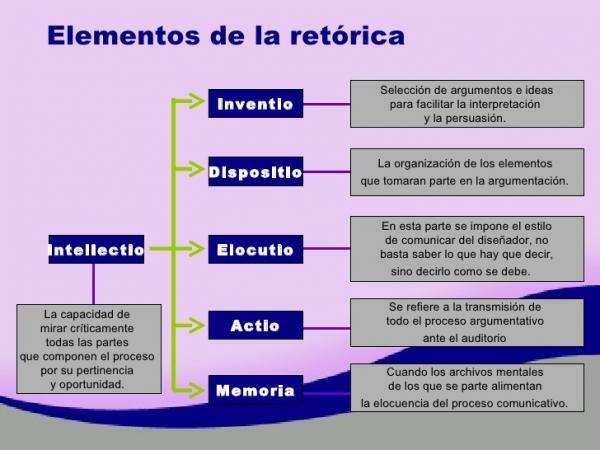
Examples of rhetoric today.
Without time or space to list each and every one of the situations in which we are presented with a persuasive text for the purpose of specific reaction, we will highlight, perhaps, the most relevant and well-known of the world around us, depending on the areas in which they are employs. Here we leave you some examples of rhetoric in today's society that will help you better understand the context:
- Judicial areas: Have you ever seen a movie where a trial takes place that ends with an emotional speech by the protagonist or lawyer on duty? Yes, that final punchline of the trial that turns the jury in favor of the good guys in the film is steeped in rhetorical devices of linguistic persuasion. This also happens in real life, although without tear music in the background.
- Political spheres: Another example of rhetoric is found in the political sphere. Of course, political speeches are strictly based on rhetorical instances honed over the years. The purpose of convincing your voters or other parties in congress is a well-structured, studied and planned job under the premises of the Rhetoric of Aristotle. And it is true that, without a doubt, the more persuasive a speech is, the more effective and successful it will be.
- Advertising scopes: If someone is an expert in convincing us and making us buy things we don't need, he is a good publicist. The advertisements, although often lacking in extensive texts, are full of rhetorical devices studied to the millimeter to attract our attention and create a need in us. It is not a secret that this is the main objective of advertising, and it is in this area where the rhetorical discourse has best adapted and evolved.
- Domestic environment: Do not deny it. How many times have you planned a speech in your head in order to convince someone of something or hope that your parents will give you that thing or let you go to some place or event? Yes, we ordinary people are also experts in rhetoric. And it is that, as we anticipated, the rhetorical speech is in each small conversation with a persuasive charge that seeks an effect on the interlocutors. No matter the language or the place, rhetoric is part of our language.
If you want to read more articles similar to What is rhetoric - with examples, we recommend that you enter our category of Grammar and Linguistics.
Bibliography
- Andruet, A. S. (2003). The forensic discourse: its parts. The legal phenomenon, VI, pp. 37-61.
- Fernández Fernández, E. (2006). Mandatory classical rhetoric, tradition and survival of persuasive techniques in advertising. [Doctoral thesis, Complutense University of Madrid]. Institutional repository of the UCM.
- López Eire, A. (1995). Ancient rhetoric and modern rhetoric. HVMANITAS, XLVII.
- [The Eden of the Cynics] (January 7, 2020). Rhetoric: the art of manipulating and persuading [Video].

